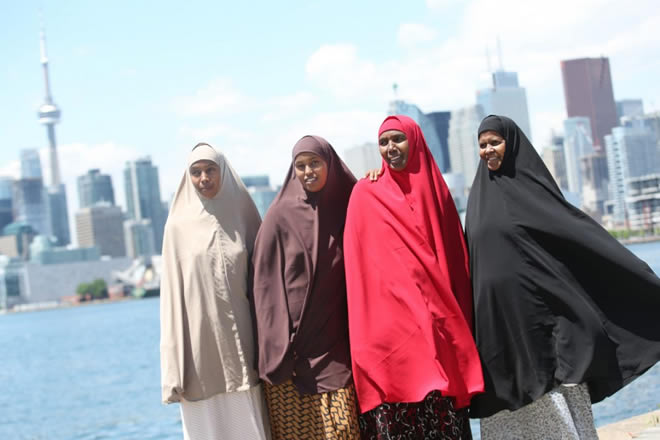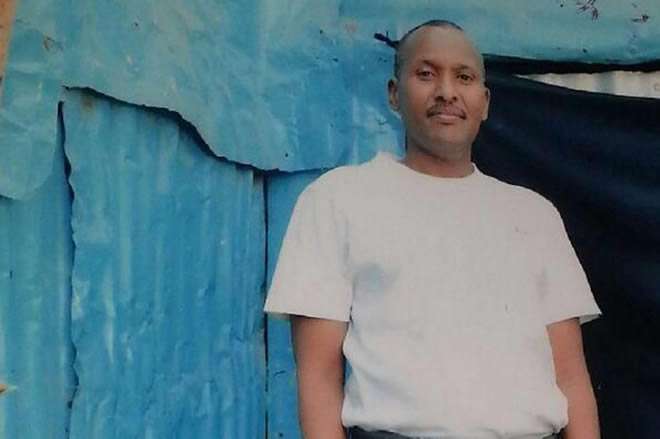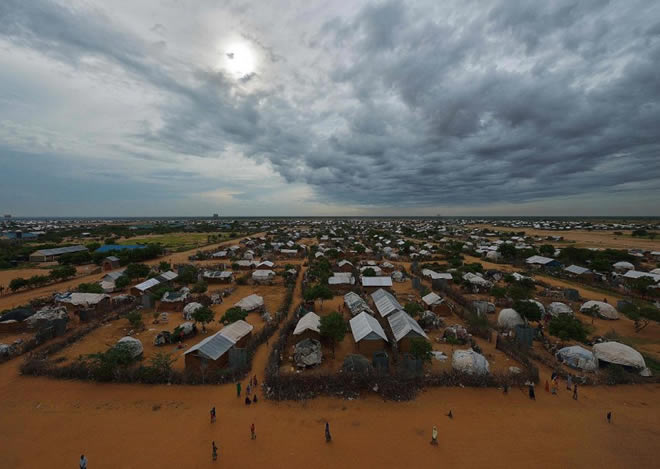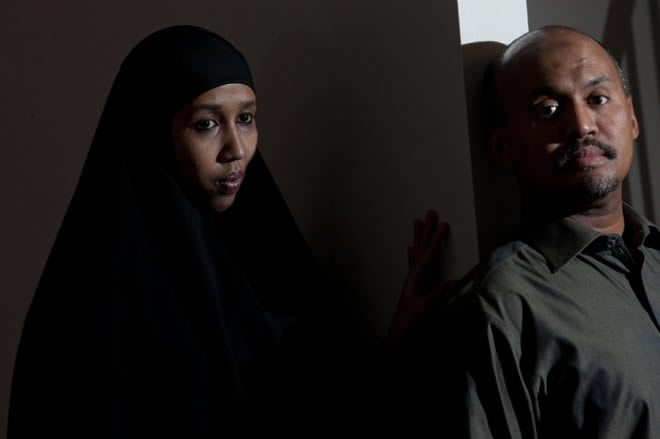
Wednesday, July 06, 2016
By DEBRA BLACK
Bashir Makhtal is serving a life sentence in Ethiopia after a “deeply unfair” trial. But his family is finally tasting freedom after finding refuge in Canada.

Members of the Bashir clan, from left, Zaynab Bashir, Suwdi Ahmed, Mulki Salah and Rukiya Makhtal, are so grateful to finally taste freedom after years of uncertainty living in refugee camps in Kenya. All are relatives of Bashir Makhtal, a Toronto man who is behind bars in Ethiopia after a trial rights groups have called "deeply unfair." (VINCE TALOTTA / TORONTO STAR)
Their journey to Canada begins and ends with a man some of them have never met.
After fleeing torture and imprisonment in Ethiopia and then eight years of waiting in UN refugee camps in Kenya, the extended family of a Canadian serving a life sentence in Ethiopia has arrived in Canada to start a new life.
Bashir Makhtal, who lived in Toronto before his arrest on the border of Kenya and Somalia in 2006, is behind bars in Addis Ababa after being convicted of terrorism charges at a trial human rights groups have called “deeply unfair.” He has always maintained his innocence.
Eleven of Makhtal’s relatives have now settled in Kitchener-Waterloo as government-assisted refugees. Three more are still to arrive. At the head of the clan are two iron-willed matriarchs — Mulki Salah, who is married to Makhtal’s nephew, and Rukiya Makhtal, Makhtal’s oldest sister and mother-in-law to Salah.
“I never even dreamed I would be alive,” said 59-year-old Rukiya, who spent 18 months in prison. She said she had endured beatings and torture before going to the refugee camps. “I never even dreamed I would have a life.”
On this Canada Day, they are thankful for their new home and the freedom and safety it provides. “I have no words to thank Canada (for) what they did for me and my family, and hope they will continue helping those who are in need wherever they are, including our loved one, Bashir,” said Mulki.
Added Rukiya: “We are so thankful to Canada that they got us from the refugee camp in Kenya and brought us to this great country.”

Bashir Makhtal, a Toronto man, is behind bars in Ethiopia after a trial rights groups have called "deeply unfair." Efforts are underway to have him returned to Canada. (FAMILY PHOTO)
Amnesty International Canada asked Ottawa to bring the family here several years ago, after learning of the struggles they faced in the camps. But it wasn’t until the new Liberal government took power that inroads were made in the refugee system, Alex Neve, secretary general of the human rights organization, told the Star. They arrived in late May.
The Canadian government is now trying to negotiate a prison transfer for Makhtal, who is in his 40s, but it is stalled in Ethiopia, sources told the Star.
Members of the extended family say they have suffered greatly because of their association with Makhtal. Both women, along with other family members, were arrested almost immediately after Makhtal was detained in Nairobi and forcibly taken in chains to Ethiopia, where he was imprisoned.
The family was living in Jijiga in the Somali region of Ethiopia at the time. Shortly after Makhtal’s arrest, Ethiopian government troops came after them, the women said.
Until now, they have not spoken to Western media about what they say transpired behind bars as Ethiopian officials tried to get them to divulge information about Makhtal. They and others were held captive, tortured and sexually assaulted, the women said.
The government accused them of aiding and abetting the Ogaden National Liberation Front — an independence movement Makhtal’s grandfather started — and conspiring with Makhtal.
The Star contacted the Ethiopian Embassy about the allegations, but got no response.

Bashir Makhtal's family ended up in the UN refugee camp, Dadaab, in Kenya, where life was difficult and the family worried the camp was infiltrated by spies. (TONY KARUMBA/AFP/GETTY IMAGES)
Makhtal’s oldest brother Hassam Ahmed Makhtal was also imprisoned and tortured, dying in 2009 from injuries sustained in an Ethiopian jail, according to relatives. One of his sons died alongside him; another is in prison in Addis Ababa and a third is a refugee in Calgary.
In an interview with the Star, Mulki, who was taken to a military prison, said she was strung up by her feet and her face was dipped into a container of an unknown substance that left temporary scars. At one point, the 49-year-old said, her captors tried to strangle her with a wire; on another occasion, she said, she was sexually assaulted and stabbed with a bayonet.
All around her, others were also suffering. She said her captors would undress the prisoners and beat them with sticks and guns while they were naked. She was held in jail for four months and 12 days. Near the end of her imprisonment, she said, guards left her for dead in the bushes after she passed out while being tortured. She managed to escape with the help of a shepherd.
Said Mulki: “Every night they used to take me at 1 a.m. and at around 4 a.m. Every time they used anything you can imagine to torture — the back of the gun. I have been electrocuted on my stomach.”
As they discuss details of their ordeal, the women turn their eyes away, embarrassed by what has happened to them. Tears run down their cheeks.
Mulki’s daughter Zaynab Bashir, 25, and her niece Suwdi Ahmed, the 18-year-old daughter of Hassam Ahmed Makhtal, sob as they listen to the women recount their experiences.

Makhtal Bashir's cousin Said Makhtal, right, and Bashir's wife, Asiso Abdi, who live in Hamilton are working tirelessly at gaining Canadian governmental support in the hopes of getting Bashir Makhtal released. (GLENN LOWSON)
Once Mulki and Rukiya escaped, they sent for their children and headed for the safety of a refugee camp. With the help of Somali communities along the way, each ended up at the UN refugee camp, Dadaab, in Kenya. Others followed them to the camp one by one. But Mulki’s husband escaped and sought refugee status in the United States, where he now lives.
Life in Dadaab wasn’t easy for the Makhtal clan. They didn’t feel safe and worried that Ethiopian spies had infiltrated the camp and were sending back information about their whereabouts.
They stopped sending their children to the camp school, they said, when they spotted in the camp some of the prison guards who had earlier tortured them. But one of Mulki’s nephews refused to abide by the edict and went to school anyway, she explained. He never came back, she said. That was in December 2010. The UN transferred the entire clan to Kakuma, another refugee camp, in 2011.
Life in Kakuma was even worse, they said. Zaynab said the family feared that for a little bit of money other refugees might kill them.
“Ethiopia knew where we were,” she said. “Our life became even more dangerous. We had been settled in a place where there is a metal gate and they put security at the door and no one can go out or come in without reporting to the security guard. We were pretty much in what was like prison.”
“When we were kids in Ethiopia, many years ago, we had a good life,” said Zaynab. “We had a happy family. We were going to school. But after they started attacking our family, we lost everything.”
Even now they remain tentative, nervous — not quite sure they are safe here. And they’re concerned about the status of Bashir Makhtal. Even though Mulki Salah has never met her husband’s uncle, she wants desperately for him to come back to Canada and serve the remainder of his sentence in a Canadian jail. So do the others.
“The thing we want to see most is we want to see Bashir alive here,” said Mulki. “We understand the pain he’s going through because we went through it … All the years he was in prison, we were either in prison or in a refugee camp.”
Both women are forever grateful to Canada for giving them a chance to live in freedom.